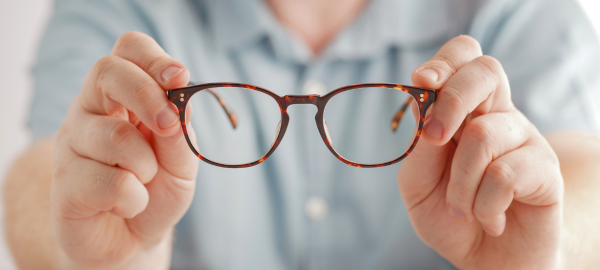Anti-glare Glasses

Reviewed by
Maria Horan FBDO
Did you know that standard lenses transmit around 91% of light to the eye? The remaining 9% is lost to surface reflection. Anti-glare glasses help solve this problem, among others.
Many don’t know the role played by reflection when wearing prescription glasses and aren’t sure whether or not to get anti-glare glasses. It’s important to be able to make an informed decision, so we’ve gone ahead and put together this guide to explain it.
What are anti-glare glasses?
Lens coatings are vital in improving vision clarity and the durability of your eyeglass lenses. There are many types, and they can be applied to glasses regardless of whether you wear single-vision, bifocal, or progressive lenses.

One of the available lens coatings you can choose from is anti-glare coating, also called anti-reflective coating. This is a microscopic multilayered coating that’s applied to your lenses to reduce their ability to reflect lights. As a result, it helps keep your vision clear
How does anti-reflective coating work?
Thanks to their anti-glare coating, anti-glare glasses reduce the amount of light that reflects off lenses. This results in more light passing through the lens and greater visual clarity.
Not only do they help you see better, but they also help reduce the light visibly reflected by the lens, which can be annoying at times.

Anti-glare glasses benefits
There are more benefits to anti-reflective glasses than you might think; here are some of the advantages of choosing anti-glare coatings:
- Adding an anti-glare coating to your night driving glasses can improve vision in low-light conditions, which results in safer driving.
- Anti-glare coatings improve clarity when working in front of a screen, resulting in reduced eye strain.
- Anti-glare coatings can reduce visual fatigue caused by reflections, resulting in less eye strain.
- Your eyes are more visible through anti-reflective lenses, which helps keep eye contact when wearing glasses and makes for better photos if taken wearing eyewear.

If you wear glasses all day, every day, anti-reflective coating is likely a good choice for you. It will give you the most natural visual experience and place less strain on your eyes.
Disadvantages of anti-glare glasses
You may also experience a few disadvantages when wearing anti-glare glasses, including the fact that you’ll need to clean your lenses more often. This is because, due to its nature, the anti-glare lens coating can highlight dirt or dust.
Scratches will also be more visible, which means your anti-glare lenses will need to be handled with extra care. To learn more on how to properly take care of your glasses, check out our tutorial below.
DID YOU KNOW?
In addition to reducing glare and lens reflections, anti-glare coating also reduces your exposure to blue light.

Do I need anti-glare on my glasses?
Anti-glare coating is not strictly necessary, however we recommend it as it will improve everyday comfort and the overall performance of your lenses. It can be applied to almost all types of glasses, including sunglasses.
Can you add anti-glare to glasses after purchase?
No, unfortunately anti-glare coating cannot be added to your lenses after purchase. However, there are many affordable frame options you can get with anti-glare coating that won’t break the bank.
Are anti-glare and blue-light glasses the same?
No, anti-glare and blue light glasses are not the same. Blue light block and anti-glare are two different types of coatings, designed for different purposes.
As the name implies, blue-light block coating blocks the wavelengths of blue light from reaching your eyes. Anti-glare coating doesn’t block light, instead, it reduces reflection.

Blue light block coating can be added as an additional coating to your lenses when purchasing your glasses – that way you’ll experience the benefits of both these coatings.
How to care for glasses with anti-glare coating
As mentioned above, anti-glare glasses might need to be handled with more care than regular glasses. To make sure your glasses are always cared for properly, remember to:
- Store the glasses in their protective case when you’re not wearing them.
- Always use a microfiber cloth when wiping off their lenses.
- Use an optical spray to keep them extra clean.

Remember to avoid cleaning your glasses with shirts or chemical cleaners, as this might damage your glasses.
What’s the best coating for me
For more information on the different types of lens coatings available, you can read this article here. Ultimately, the best lens coatings for you will depend on your lifestyle and vision needs.
If you have questions on lens coatings and which to choose feel free to reach out, our opticians will be happy to help you find the best solution.
Related articles



Related articles



Anti-glare Glasses

Reviewed by
Maria Horan FBDO
Did you know that standard lenses transmit around 91% of light to the eye? The remaining 9% is lost to surface reflection. Anti-glare glasses help solve this problem, among others.
Many don’t know the role played by reflection when wearing prescription glasses and aren’t sure whether or not to get anti-glare glasses. It’s important to be able to make an informed decision, so we’ve gone ahead and put together this guide to explain it.
What are anti-glare glasses?
Lens coatings are vital in improving vision clarity and the durability of your eyeglass lenses. There are many types, and they can be applied to glasses regardless of whether you wear single-vision, bifocal, or progressive lenses.

One of the available lens coatings you can choose from is anti-glare coating, also called anti-reflective coating. This is a microscopic multilayered coating that’s applied to your lenses to reduce their ability to reflect lights. As a result, it helps keep your vision clear
How does anti-reflective coating work?
Thanks to their anti-glare coating, anti-glare glasses reduce the amount of light that reflects off lenses. This results in more light passing through the lens and greater visual clarity.
Not only do they help you see better, but they also help reduce the light visibly reflected by the lens, which can be annoying at times.

Anti-glare glasses benefits
There are more benefits to anti-reflective glasses than you might think; here are some of the advantages of choosing anti-glare coatings:
- Adding an anti-glare coating to your night driving glasses can improve vision in low-light conditions, which results in safer driving.
- Anti-glare coatings improve clarity when working in front of a screen, resulting in reduced eye strain.
- Anti-glare coatings can reduce visual fatigue caused by reflections, resulting in less eye strain.
- Your eyes are more visible through anti-reflective lenses, which helps keep eye contact when wearing glasses and makes for better photos if taken wearing eyewear.

If you wear glasses all day, every day, anti-reflective coating is likely a good choice for you. It will give you the most natural visual experience and place less strain on your eyes.
Disadvantages of anti-glare glasses
You may also experience a few disadvantages when wearing anti-glare glasses, including the fact that you’ll need to clean your lenses more often. This is because, due to its nature, the anti-glare lens coating can highlight dirt or dust.
Scratches will also be more visible, which means your anti-glare lenses will need to be handled with extra care. To learn more on how to properly take care of your glasses, check out our tutorial below.
DID YOU KNOW?
In addition to reducing glare and lens reflections, anti-glare coating also reduces your exposure to blue light.

Do I need anti-glare on my glasses?
Anti-glare coating is not strictly necessary, however we recommend it as it will improve everyday comfort and the overall performance of your lenses. It can be applied to almost all types of glasses, including sunglasses.
Can you add anti-glare to glasses after purchase?
No, unfortunately anti-glare coating cannot be added to your lenses after purchase. However, there are many affordable frame options you can get with anti-glare coating that won’t break the bank.
Are anti-glare and blue-light glasses the same?
No, anti-glare and blue light glasses are not the same. Blue light block and anti-glare are two different types of coatings, designed for different purposes.
As the name implies, blue-light block coating blocks the wavelengths of blue light from reaching your eyes. Anti-glare coating doesn’t block light, instead, it reduces reflection.

Blue light block coating can be added as an additional coating to your lenses when purchasing your glasses – that way you’ll experience the benefits of both these coatings.
How to care for glasses with anti-glare coating
As mentioned above, anti-glare glasses might need to be handled with more care than regular glasses. To make sure your glasses are always cared for properly, remember to:
- Store the glasses in their protective case when you’re not wearing them.
- Always use a microfiber cloth when wiping off their lenses.
- Use an optical spray to keep them extra clean.

Remember to avoid cleaning your glasses with shirts or chemical cleaners, as this might damage your glasses.
What’s the best coating for me
For more information on the different types of lens coatings available, you can read this article here. Ultimately, the best lens coatings for you will depend on your lifestyle and vision needs.
If you have questions on lens coatings and which to choose feel free to reach out, our opticians will be happy to help you find the best solution.
Related articles



Related articles











































